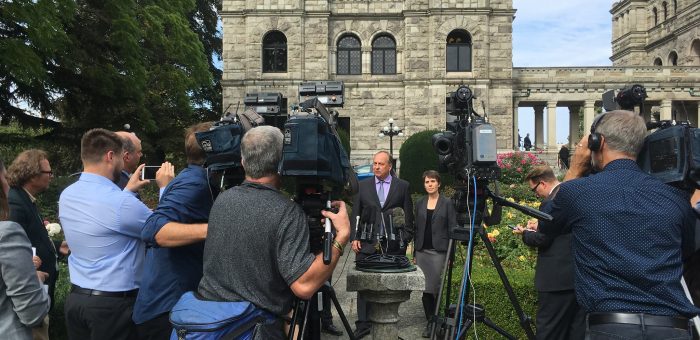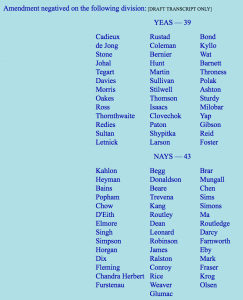On moving the fixed fall election date from October 2021 to October 2020
Today in the BC Legislature the BC Liberals proposed an amendment at committee stage to section 3 of Bill 5: Constitution Amendment Act 2017. The purpose of this amendment was to change the date of the next election from October 2021 to October 2020.
After listening to the arguments proposed by the BC Liberals I stood and spoke against the amendment.
The BC Liberals subsequently called for a standing vote and the amendment was defeated.
Below I reproduce the video and text of my statement. These outline the reasons why I voted the way I did. I also append the results of the vote.
Video of Statement
Text of Statement
A. Weaver: I rise to speak against the amendment put forward today by the official opposition, for a number of reasons. The amendment, of course, as we know, is to change the fixed election date to 2020 instead of 2021. The member opposite does himself a disservice when he continues to refer to government here as a coalition.
The member opposite, as he tries to put forward his wealth of expertise in democratic reform in British Columbia, should know at a very fundamental level that a coalition is not what we have here in British Columbia. It is a minority government, where the majority of members in this House support the B.C. NDP in government.
It would do this member well — and it would do opposition members opposite well — if they actually were to be factual in their responses and debates. To mislead British Columbians by talking about things like a B.C. coalition is not fitting of members of this place.
We know that it is a minority government, under the great vast tradition of Westminster parliamentary democracies, where the government of the day, the B.C. NDP, is supported by the three B.C. Green members in a minority, not a coalition. So I correct that for the record.
We know that under the Constitution Act, we must have an election every five years. The member opposite, again, in what I can only describe as a somewhat revisionist history, forgets to point out that in 1986, the Social Credit government, the 1986 elected Social Credit government did not have an election for five full years, until 1991. Five years — not four years, as was suggested by the members opposite.
Here, what is happening, and why I do not support the amendment and why I support the original legislation, is as follows. Again, in the tradition of Westminster parliamentary democracies, we stood here in this House and pointed out to the B.C. Liberals this past summer that they did not have the confidence of the House. We didn’t quietly spring this on them at the last minute. In fact, shortly after we signed the confidence and supply agreement…. As, I’m so pleased to say, is signed in a similar manner in New Zealand, between the labour party there and the Greens, celebrated today in some of their housing policies.
We signed this agreement and told British Columbians that we would have this agreement signed before the writ was returned because we wanted to instil confidence, and we wanted to ensure that British Columbians had certainty as we moved forward. So we messaged out to British Columbians, through this government, that on May 31, we were going to support a B.C. NDP minority government.
Hon. Speaker, members opposite, despite saying they would call back the House soon, took their time. We waited months for this to come. So to say it’s four and a half years is simply incorrect. We wasted months by this government, not willing to stand up and have confidence tested in this House, somehow in denial that we live in a parliamentary democracy. So to say it’s four and a half years is flat out wrong. That is why I continue to support the bill as it stands and speak against this amendment.
We talk about precedent. We had three independent MLAs in this House: one who formally was with the B.C. NDP, Bob Simpson, who sat as an independent; one who was formally with the B.C. Liberals, John van Dongen, who also sat as an independent; and then, of course, our friend and colleague Vicki Huntington, who was the only independent MLA in British Columbia to be re-elected as an independent. The three of them got together and they made recommendations.
They made recommendations to bring the election to the fall, as we did, but they also recommended and they also suggested that it was important to recognize that we need to go a little longer because of some time for Elections B.C. to adjust. So this is not some kind of surprise, as suggested by the member opposite, the member for Nechako Lakes. This is no surprise to British Columbians. This is precisely what happened in 1986 when the Social Credit government served for five years.
It’s what was recommended in the bill brought forward, which is somehow not being raised by members opposite. They refer to previous NDP opposition bills — not referring to the independent members’ bill, which was truly independent, with one member from the B.C. Liberals, one from the NDP, and Vicki Huntington, suggesting otherwise.
With that, hon. Speaker, I thank you for your time, and I do appreciate the opportunity to speak against this amendment.
The Vote
Comments are closed.





